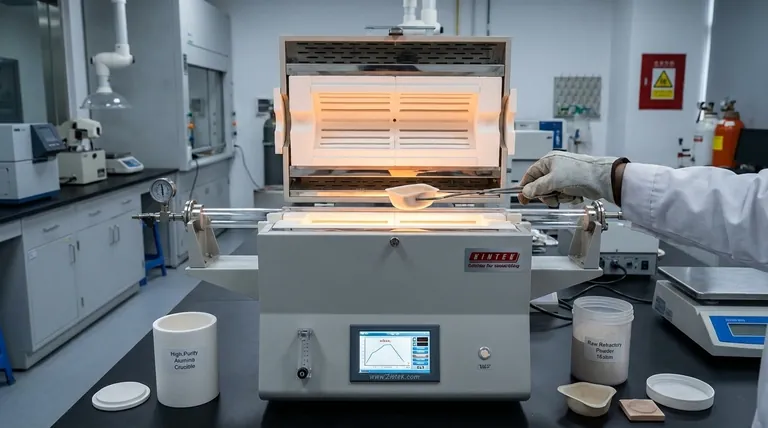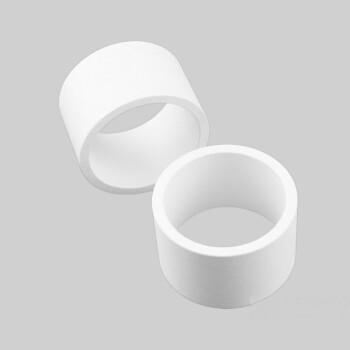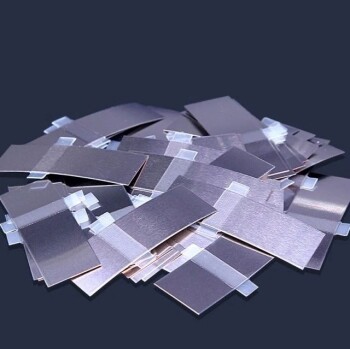At their core, refractory materials are defined by their ability to withstand extreme conditions. The primary requirements are a high melting point, the capacity to remain stable at high temperatures, resistance to thermal shock, and the ability to resist chemical attack from the specific environment in which they are used.
Choosing a refractory material is not merely about finding the highest melting point. It's about engineering a precise balance of thermal, chemical, and mechanical properties tailored to the unique stresses of a specific high-temperature process.

The Pillars of Refractory Performance
A material's suitability as a refractory depends on its performance across three key categories: its response to heat, its interaction with its chemical environment, and its ability to withstand physical forces.
Thermal Properties: Resisting the Heat
This is the most fundamental requirement. A material that fails under thermal load is not a refractory.
High Refractoriness (Melting Point)
The material must have a very high softening or melting point. It cannot deform or break down under its designed operating temperatures, which are often well over 1000°C (1832°F).
Thermal Shock Resistance
This is the ability to withstand rapid changes in temperature without cracking or spalling. A material with poor thermal shock resistance will fail quickly in processes that involve fast heating or cooling cycles. For instance, in certain furnace linings, high-purity alumina with very low silica is required specifically to prevent this type of failure.
Thermal Conductivity
This property can be a dual requirement. For furnace linings, you typically want low thermal conductivity to insulate the furnace and conserve energy. For applications like crucibles that need to transfer heat, you would require high thermal conductivity.
Chemical Stability: Surviving the Environment
Heat is rarely the only challenge. The chemical atmosphere and substances within the process can actively attack and degrade refractory materials.
Resistance to Chemical Attack
The refractory must be non-reactive with the materials it comes into contact with, whether they are solids, liquids, or gases. A refractory lining for a steel ladle must resist molten metal and slag, while a furnace lining must resist the process atmosphere.
The Critical Role of Purity and Composition
The chemical makeup of the refractory itself is paramount. As an example, the refractory used in a hydrogen-based sintering furnace must be non-reactive in a pure hydrogen atmosphere. This is why high-alumina or alumina-silicate materials are chosen. Impurities can drastically lower performance. Even small amounts of silica in an alumina refractory can be detrimental in a hydrogen atmosphere, as the hydrogen can react with the silica, leading to material degradation and failure.
Mechanical Strength: Enduring Physical Stress
A refractory must maintain its shape and integrity under physical loads, which are often amplified by high temperatures.
Hot Strength (Creep Resistance)
This refers to the material's ability to resist slow deformation under load at high temperatures. The refractory must be strong enough to support its own weight and any additional structural loads without sagging or collapsing over time.
Abrasion and Erosion Resistance
In applications where hot gases, liquids, or solids are moving at high velocity, the refractory material must be hard enough to resist physical wear and erosion.
Understanding the Trade-offs
No single refractory material is perfect for every application. The selection process always involves balancing competing properties and costs.
Purity vs. Cost
Higher purity almost always means better performance and higher refractoriness. The high-purity alumina required for the hot zone of a hydrogen furnace is far more expensive than standard alumina-silicate firebricks used in less critical areas.
Insulation vs. Strength
Often, the best insulating materials have higher porosity (more air gaps). This increased porosity, however, typically reduces the material's mechanical strength and resistance to chemical attack. Multi-layer furnace linings often use a dense, strong "hot face" brick backed by lighter, more insulating bricks.
Chemical Resistance is Specific
A refractory that is highly resistant to an acidic slag may be quickly destroyed by a basic slag. The choice of an "acidic" refractory (like silica) or a "basic" one (like magnesia) is entirely dependent on the process chemistry.
Selecting the Right Refractory for Your Application
Your final choice must be guided by the single most demanding aspect of your process.
- If your primary focus is extreme temperature and chemical purity: You must invest in high-purity materials like alumina or zirconia, especially if operating in a reactive atmosphere like pure hydrogen.
- If your primary focus is general insulation in a stable atmosphere: Cost-effective alumina-silicates, such as firebricks or castables, provide a balanced profile for less demanding applications.
- If your primary focus is surviving rapid heating and cooling: Prioritize materials specifically engineered for high thermal shock resistance, paying close attention to composition to avoid problematic impurities.
Ultimately, a successful refractory selection matches the material's specific properties to the precise demands of its operating environment.
Summary Table:
| Key Requirement | Description | Key Property |
|---|---|---|
| Thermal Performance | Withstands extreme temperatures and rapid changes. | High Melting Point, Thermal Shock Resistance |
| Chemical Stability | Resists attack from molten metals, slags, and process atmospheres. | Chemical Inertness, High Purity |
| Mechanical Strength | Maintains integrity under physical load at high temperatures. | Hot Strength, Abrasion Resistance |
Need a Refractory Solution for Your High-Temperature Process?
Selecting the right refractory material is critical to the efficiency, safety, and longevity of your equipment. The wrong choice can lead to premature failure, costly downtime, and contamination.
KINTEK specializes in high-performance lab equipment and consumables, including refractory solutions for demanding environments. We understand the precise balance of thermal, chemical, and mechanical properties needed for your specific application—whether it's a hydrogen furnace, a steel ladle, or a research kiln.
Let our experts help you:
- Match material properties to your exact process conditions.
- Source high-purity materials like alumina and zirconia for critical applications.
- Optimize performance and cost-effectiveness for your laboratory or production needs.
Contact KINTEL today for a personalized consultation and ensure your high-temperature processes are built on a foundation of reliability.
Visual Guide

Related Products
- 1400℃ Laboratory High Temperature Tube Furnace with Alumina Tube
- Laboratory Muffle Oven Furnace Bottom Lifting Muffle Furnace
- 1800℃ Muffle Oven Furnace for Laboratory
- High-Purity Titanium Foil and Sheet for Industrial Applications
- 1700℃ Laboratory High Temperature Tube Furnace with Alumina Tube
People Also Ask
- Why is a quartz tube furnace utilized in the thermal oxidation of MnCr2O4 coatings? Unlock Precise Selective Oxidation
- How to clean a tube furnace? A Step-by-Step Guide for Safe and Effective Maintenance
- How does a quartz tube vacuum furnace contribute to the crystallization process of Ag-doped Li-argyrodite electrolytes?
- How does a high-temperature tube furnace facilitate the phase transformation of alumina products? Master Thermal Control
- What is a tubular furnace used for? Precision Heating for Material Synthesis & Analysis



















